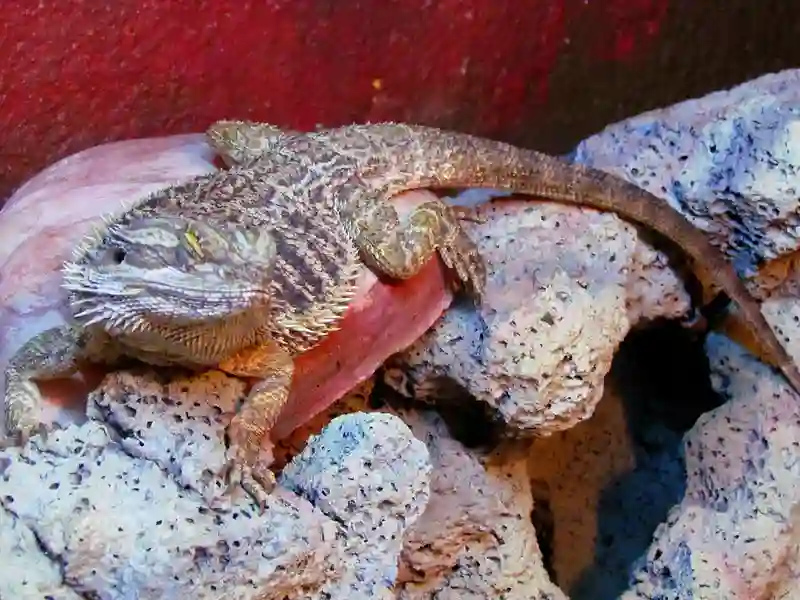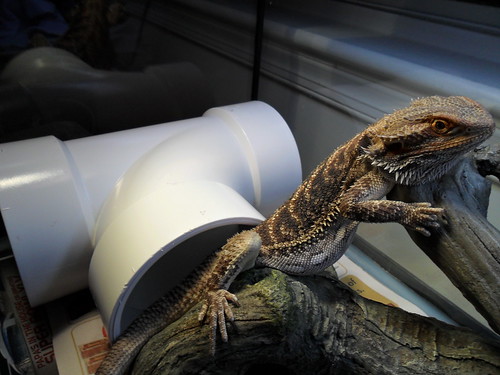Impaction, stress, dehydration, and an unbalanced diet are all possible causes of a bearded dragon not pooping during winter. During winter, as they may enter a period of brumation, which is similar to hibernation. During this time, they may sleep more and eat less, which can cause them to poop less frequently.
If your bearded dragon is not pooping during the winter, there are a few things you can do to help them out. I recommend taking the following steps to ensure that your bearded dragon is healthy and happy during the winter season.
From providing a warm environment to making sure your dragon is getting the right supplements, I will discuss the five things you can do to help your dragon’s digestion. Keep reading to learn more about how to help your bearded dragon if it is not pooping during winter.
Possible reasons for lack of bowel movements during winter
Bearded dragons are fascinating pets, and their digestive system is an essential aspect of their health. It’s not uncommon for bearded dragons to experience a lack of bowel movements during the winter months. There are a few reasons why this may happen, and it’s crucial to identify them and take action to prevent serious health issues.
Reduced activity levels due to hibernation-like state
During the winter, bearded dragons tend to enter a hibernation-like state known as brumation. During this time, they reduce their physical activity levels significantly.
This reduction in activity can cause digestive problems, leading to constipation or lack of bowel movements. As a pet owner, you must monitor your bearded dragon’s behavior closely during the winter months.
Signs that your bearded dragon is brumating include reduced appetite and lethargy. If you see these symptoms, it’s essential to take action promptly.
Decreased appetite and food intake
Bearded dragons require a lot of energy from food to maintain their body functions properly. During the winter months, they may eat less due to lower metabolic rates caused by external temperature changes in their environment.
If your bearded dragon is eating less than usual or refusing food altogether, it may lead to constipation or lack of bowel movements. In such cases, offering smaller meals regularly rather than larger portions can help stimulate digestion.
Inadequate hydration
Another reason why your bearded dragon could experience a lack of bowel movement is inadequate hydration levels in their body. Water plays an essential role in digestion – without it; stool can become hard and difficult to pass.
During colder months when humidity drops due to heating systems running indoors more frequently, providing additional moisture sources such as misting or bathing can help maintain proper hydration levels. Another option is to provide a shallow dish of water that the bearded dragon can drink from as needed.
Understanding the possible reasons for lack of bowel movements during winter, such as reduced activity levels, decreased appetite and food intake, and inadequate hydration will enable you to take appropriate action to support your pet’s digestive health.
By monitoring your bearded dragon’s behavior and providing essential care measures such as offering warm baths or adjusting their diet can help prevent serious health problems in the long run.
Increase temperature in enclosure
How temperature affects digestion in bearded dragons
Bearded dragons are cold-blooded reptiles that require a certain range of temperatures to regulate their bodily functions. At lower temperatures, their metabolism slows down, and they become less active.
A lower body temperature can also lead to digestive problems, including constipation. By increasing the temperature in your bearded dragon’s enclosure, you can help stimulate its digestive system and encourage bowel movements.
Ways to increase temperature
There are several ways to increase the temperature in your bearded dragon’s enclosure. One common method is to use a heat lamp or ceramic heater. These devices emit infrared radiation which warms up the air and surfaces in the enclosure.
You can adjust the height of the lamp or heater to vary the intensity of the heat source. Another option is to use heat mats or pads placed under one side of the enclosure, creating a thermal gradient for your bearded dragon to choose from.
This helps mimic natural conditions where they may move between warmer and cooler areas depending on their needs. It’s important not to overheat your bearded dragon’s environment as it can lead to dehydration and other health issues.
Offer warm baths
How warm water can stimulate bowel movements
A warm bath is an effective way of stimulating your bearded dragon’s bowel movements when constipated during winter months. Warm water helps increase circulation in their system, making it easier for them to pass stool by relaxing muscles around the colon area.
Steps on giving a warm bath
To give a warm bath properly, fill up a shallow tub with lukewarm water (not too hot) that is just enough for your pet’s legs with its body above water level).
Let them soak for about 10-15 minutes, gently rubbing their belly or under the tail (not too aggressively) to stimulate bowel movements. After the bath, dry your bearded dragon thoroughly with a towel and return it to its enclosure.
Provide more hydration
Importance of hydration for digestion
Bearded dragons require access to water at all times to aid their digestion. During winter months, they may reduce their water intake due to lower activity levels. Dehydration can lead to constipation and other digestive problems.
Ways to provide more hydration
To ensure your bearded dragon is properly hydrated during the winter months, you can mist its enclosure with clean water several times a day or offer shallow dishes of fresh water for them to drink from. You can also try feeding moisture-rich foods such as leafy greens or fruits like melons, strawberries and cucumber.
It’s important not to overhydrate your bearded dragon as this can also lead to health issues. Make sure there’s a balance in their diet between wet and dry foods.
Adjust diet
Explanation of how diet affects bowel movements
Diet plays an important role in regulating your bearded dragon’s bowel movements. Feeding them the wrong type of food can cause gastrointestinal problems like constipation and bloating.
Suggestions for foods that may aid digestion
To help regulate bowel movements during winter months, you can try adding more fiber-rich foods such as leafy greens (kale, collard greens) into your pet’s meals. Offering small amounts of fruit such as figs or papaya is also beneficial since they are high in natural sugars which work as a laxative.
You should avoid feeding fatty or protein-heavy food items during the winter season that could cause digestive issues like constipation; stick instead with vegetables and fruits rich in fiber, vitamins and minerals for optimal nutrition.
Consult with a vet
Explanation on the importance of consulting with an expert veterinarian.
If your bearded dragon is not responding to any of these remedies, it might indicate a more serious underlying issue. That’s why it’s important to consult a reptile veterinarian who can diagnose the problem and provide appropriate treatment.
How they can help
Veterinarians who specialize in reptiles have experience dealing with constipation in bearded dragons and other digestive issues.
They can perform diagnostic tests such as X-rays and blood work if necessary to identify the cause of your pet’s bowel problems. They may also recommend medication or a special diet plan that can alleviate constipation symptoms.
Conclusion
Bearded dragons are fascinating pets that require proper care to stay healthy. As winter months approach, it’s essential to keep an eye on their bowel movements since constipation and other digestive issues are common during this season.
By increasing temperature in their enclosure, offering warm baths, providing more hydration, adjusting their diet, and consulting a vet when necessary, you can help ensure your bearded dragon stays healthy during the winter months!



Leave a Reply